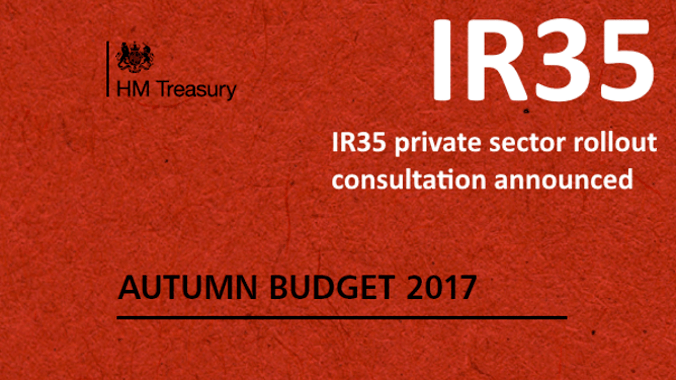The changes to IR35 currently plaguing the public sector look set to be extended into the private sector, after the Chancellor announced a consultation into off-payroll working in the private sector in the Autumn Budget.
Introduced into the public sector in April 2017, the reforms have caused unprecedented damage. With many contractors preferring to seek opportunities elsewhere rather than risk being incorrectly classed as ‘inside IR35’, public sector bodies have been starved of critical skills.
The fallout has led to delayed and cancelled projects, and the deterioration of public services such as the NHS. With the proposed private sector rollout, the Government threatens to further hamper flexible working in the UK, causing damage to UK plc on a far grander scale.
From the Budget document:
3.7 Off-payroll working in the private sector – The government reformed the off-payroll working rules (known as IR35) for engagements in the public sector in April 2017. Early indications are that public sector compliance is increasing as a result, and therefore a possible next step would be to extend the reforms to the private sector, to ensure individuals who effectively work as employees are taxed as employees even if they choose to structure their work through a company. It is right that the government take account of the needs of businesses and individuals who would implement any change. Therefore the government will carefully consult on how to tackle non-compliance in the private sector, drawing on the experience of the public sector reforms, including through external research already commissioned by the government and due to be published in 2018.
What are the IR35 reforms?
Traditionally it has been the contractor’s responsibility to evaluate their IR35 status for each contract and deduct tax accordingly. However, the reforms – already in effect in the public sector – require end clients to carry out an IR35 assessment for each contractor they engage.
If the contractor is supplied via a recruitment agency, the agency is responsible for deducting tax via Pay As You Earn (PAYE) if the contractor is judged to be caught by IR35. If the client engages the contractor directly, the client is required to make the tax deductions.
The tax liability risk also shifts further up the supply chain. If HMRC investigates and finds that a contractor has been paying tax as ‘outside IR35’ where it believes they are caught, the agency can be targeted for backdated tax, penalties and interest. This is unless it can be proven that the client hasn’t taken ‘reasonable care’ when assessing the contractor’s status, in which case they then become liable.
This creates a huge incentive for clients and agencies to assess contractors as caught by IR35, which contractors are well aware of. Extending these rules could mean many contractors will struggle to ever secure a fair IR35 assessment.
IR35 reforms – what contractors must do now!
The Government may have announced a consultation into the proposed changes, but if the public sector changes are anything to go by, the recommendations already look predetermined. Nonetheless, there is plenty that you can be doing to help protect the livelihood of flexible working in the UK.
First, join ContractorCalculator free today and help us lobby. There is already a lot going on behind the scenes, but we need as many contractors as possible to write to their MPs and alert them to the damage that the proposed changes will cause. We will be in touch via email.
You also need to be prepared for a worst case scenario, by making sure you don’t wind up in a contract that is clearly caught by IR35. Use IR35Shield.co.uk for a comprehensive IR35 assessment.
If the private sector rollout goes ahead, you need to make sure your client is well informed. We will soon be distributing material which our members can use to educate their clients and help make sure that they are given a fair IR35 assessment. Make sure you sign up to receive this.
Finally, follow ContractorCalculator CEO Dave Chaplin on LinkedIn. Dave is fully embroiled in the campaign against the IR35 reforms, and his profile provides many useful updates for contractors affected by the changes.

